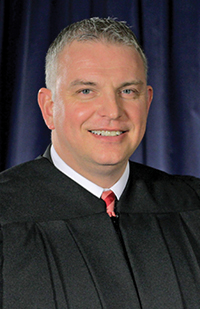Court Suspends Wage Garnishment to Counter COVID-19 Strain

Crawford County Municipal Court Judge Shane Leuthold has put wage garnishments on hold to help ease financial burdens during the pandemic.

Crawford County Municipal Court Judge Shane Leuthold has put wage garnishments on hold to help ease financial burdens during the pandemic.
In only two weeks, the Crawford County Municipal Court has been able to work through 182 wage garnishment cases and freeze them, providing financial stability for at-risk residents as the coronavirus crisis wears on.
“We're in a historical moment where we're trying to preserve people's housing, and making sure they're not destitute during these circumstances,” said Judge Shane Leuthold, who worked with Magistrate Timothy O'Leary to suspend wage garnishments in their county.
The court also has suspended eviction cases.
The freezes of both types of cases will remain in place through at least May 1.
The continuance of eviction filings and proceedings followed the primary points listed in guidance by Ohio Supreme Court Chief Justice O'Connor and the high court’s distribution three months ago of “The Judicial Guide to Public Health.”
The temporary stoppage of wage garnishing was an idea that sprang from a conversation between Judge Leuthold and O'Leary.
The garnishment freeze was complicated because of the many monetary distribution arrangements among the 182 cases. In many claims, the court acts as a liaison between the debtor, the plaintiff creditor and the employer.
The court is in the process of returning garnished money to the debtor, and those who are owed the judgment have received a judicial order explaining the circumstances.
“We haven't gotten any negative feedback,” O'Leary said. “It's been a few weeks, but there have been no complaints. I think [the creditors] understand.”
While wage garnishing and evictions are on hold, the judge and magistrate are moving forward with as many other types of cases as possible to minimize a bigger backlog.
A video conference system was installed at the Crawford County jail to allow defense attorneys direct communication with their clients. Previously, inmates were unable to have confidential discussions remotely with their attorneys.
The court also is encouraging prosecutors to schedule conversations with attorneys in criminal cases that have been delayed. Similar measures have been suggested to litigants in civil matters, with legal processes customized for cases to be resolved without a court appearance.
“We're complying with the guidelines, [and] the Supreme Court gave us that flexibility on the local level to do what would be practical for us,” O'Leary said.


